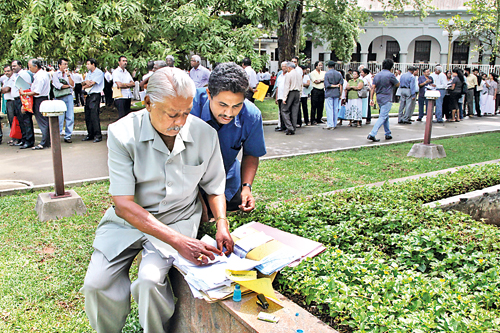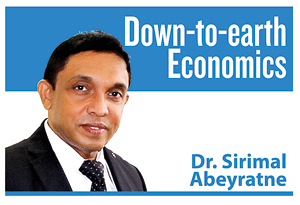Lament of the middle class
View(s):
File picture of an aggrieved depositor of the failed Golden Key company goes through his papers outside the Supreme Court during the numerous cases against the company. It was the middle class that had placed deposits in this company to get a higher return.
Recently, I received a phone call from a friend who was known to me since my childhood. For the past 40 years, however, I hadn’t met him more than a couple of times. Let’s call him Piyal, which is not his real name.
Born as the eldest in a poor family with five more siblings, I don’t think he had a pleasant childhood. Adding to the misery of poverty, he also had a drunkard father who didn’t have a sense of family responsibility. At that time, they all lived in a small clay house with a thatched roof.
Piyal was a studious child, who was keen in studies. Thanks to the free education policy, he somehow continued with his school education till the end, and passed GCE examinations too. After staying a few more years hanging around, finally he managed to get a clerical job in the accounts division of a government department; his first salary was Rs. 350 a month at that time.
While working there, he continued with improving his professional skills and acquiring higher qualifications in the same field of accounting. By the time of the retirement, he was a Chief Accountant earning a Rs. 90,000 salary.
Poverty was better
Since I received the phone call after a few years, our conversation was long and detailed. He told me: “Perhaps, you don’t know that I retired two years ago.” As we didn’t have frequent communications, I didn’t know that. He sprang on me some shocking news: “I’m bed-ridden now; I got paralyzed!”
What shocked me more than all the above was something else that he said: “I feel that I would have been better off, if I had stayed as a poor child as in those days.”
I built up “economics of progress” as explained below, after listening to him later. And I attempted to enrich it with Piyal’s stories. I am sure there are thousands and hundred-thousands of Piyals among us.
The middle class
There is no any economic term other than “development” that has been discussed and debated so widely and deeply in economics as well as in some other social sciences.
If you set aside all theoretical and technical details of the concept, “economic development means simply the expansion of the middle class.” But, what is the middle class and where does it come from?
In any society, there is a lower social class that comprised the “poor” and an upper social class that comprised the “rich.” What we see in between the poor and the rich is the middle class. Sometimes the middle class is also divided into “lower middle” and “upper middle” classes. Lower middle class is just above the poor, while the upper middle class is more advanced, but below the rich.
Income and lifestyles
The middle class can be identified mostly with their income levels, expenditure patterns and, lifestyles; all these are distinctively different from those of the poor, and unlike the rich they have to work to maintain them. Middle class people are educated so that their knowledge is higher and the exposure is wider.
They consist of mostly the white-collar employees, professionals, managers, businessmen, and even lower level technicians and clerical workers. They have relatively higher, regular and stable incomes. The middle class has access to modern household amenities and enjoy relatively better living standards. They also wish to spend more to educate their children as well.
It is the middle class which pay a significant portion of taxes too. They pay direct taxes from their higher incomes as well as indirect taxes from their higher spending.
Perhaps, one of their major problems is over-spending and over-consumption above their income levels. As a result they have to borrow in order to buy a property, build a house or buy a motor car. In fact, they have the capacity to borrow and have access to the formal lending institutions.
Originating from the bottom
In more under-developed societies, rich is a tiny social class at the top, while poor is a large social class at the bottom. The rich has exclusively luxury lifestyles and living standards, while the poor lives without even the basic needs.
With economic development over the years, one of the notable changes is the transfer of the poor from the bottom layer to the middle class – first to the lower middle class and, then to the upper middle class.
Perhaps, this transfer may not happen in one generation or as a whole. It can be made faster and broader with education and economic growth. Education equips the poor with qualifications and aspirations to move upwards. Economic growth opens up the opportunities to accommodate the upward mobility of the poor.
Sri Lankan scenario
In Sri Lanka too, according to the official poverty statistics, 28.8 per cent of people were poor in 1991; this poverty ratio has declined to 4.1 per cent by 2016. This means that over the period of 25 years, more than four million people in the country have moved upward towards and into the middle class.
 This must have happened, on the one hand, as children of the poor families receive education; then they move out of their parent’s livelihood and lifestyle patterns. At the same time, they also find the new opportunities that were created in both industry and services sectors elsewhere.
This must have happened, on the one hand, as children of the poor families receive education; then they move out of their parent’s livelihood and lifestyle patterns. At the same time, they also find the new opportunities that were created in both industry and services sectors elsewhere.
If Sri Lanka had a peaceful political environment and a higher growth momentum, the process of middle class expansion would have been even faster and broader. In spite of external obstacles and slower growth performance that can delay the upward mobility of the poor, there is an important institution – the government.
Hurting the middle class
The government has the ability and legitimate power to support or suppress the middle class formation. In principle, governments work towards reducing poverty and achieving economic development; this means that the governments should support the expansion of the middle class which is originating from the poor. However, the governments sometimes play a contradictory role too.
Let’s begin with the problem of over-taxation: Of course, there are tax evaders, but it is the middle class that pays a significant portion of the personal income taxes. Middle class aspirations are for better living standards with material wellbeing – urban living, better housing, a motor car, household amenities, better schooling for children, better health care and others. The government can tax all of them excessively and suppress the middle class.
Governments are constantly keeping the eye on places and instances where the middle class tend to spend, in order to tax them. Governments can also keep the interest rates high and hurt the middle class people who wants to borrow in order to build a house or to buy a motor car. The government can keep the electricity and water bills high, passing the losses to the middle class to pay the higher utility bills.
Paralysed middle class
The worst is, however, not any of the above. Even after getting the middle class to pay higher taxes and other fees and prices, it could be justified with better returns to what they pay; but often, it is not the case.
If the government has failed to provide a decent and efficient public transport system, the tax payers have to use their own private cars or finance some other mode of transport to go to work. If the government has failed to provide a decent health care system, the middle class has no other option than choosing private hospitals.
If the government has failed to provide better schooling and higher educational opportunities for their children, they must finance private tuitions or private schools or education abroad. If the government has failed to provide clean and safe environment to live and work, then they have to find their own mechanisms to deal with such issues.
The worst of the worst comes, when they see how their tax money is lavishly spent by someone else as if it’s that person’s own money. (The writer is a Professor of Economics at the University of Colombo and can be reached at sirimal@econ.cmb.ac.lk).


